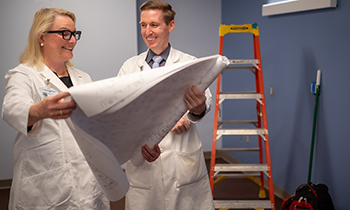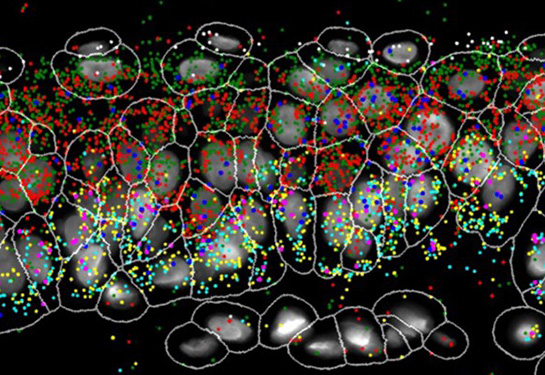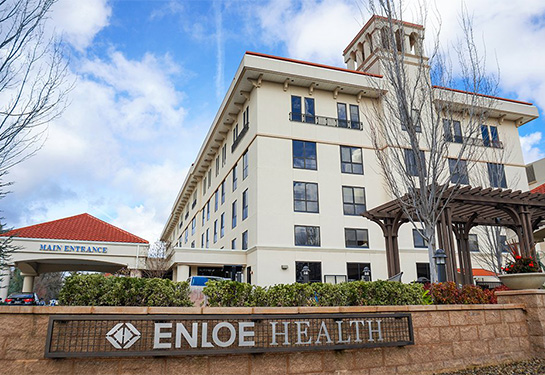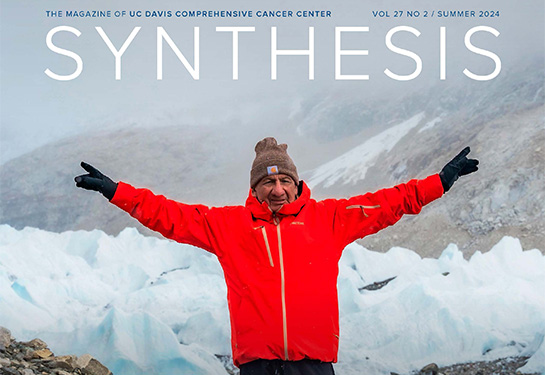Clinic transforms cancer treatment by combining diagnosis and therapy – or theranostics
Conventional treatments for cancer, such as chemotherapy, external beam radiation and surgery, don’t always work, but hope is on the horizon for some patients with certain cancers.

UC Davis Health is leveraging the next generation in nuclear medicine treatments to attack cancers in ways that traditional options cannot by themselves. The new approach, called “theranostics,” is revolutionizing cancer care by combining both diagnostics and therapeutics in delivering targeted radiotherapy. UC Davis Health is planning a new clinic dedicated to the innovative treatment.
Typically injected into the patient's bloodstream, the therapy radiopharmaceuticals travel and deliver radiation directly to a tumor site, destroying cancerous cells while leaving healthy tissue alone.
“The radiation dose is selected to ensure minimum radiation exposure to healthy tissues and maximum accuracy in targeting diseased tissues,” said UC Davis Chief of Radiology Elizabeth Morris.
As part of its growing commitment to advancing radioactive targeted therapy, the UC Davis School of Medicine Department of Radiology appointed Cameron Foster, director of the new UC Davis theranostics division and professor of clinical nuclear medicine, to oversee the construction of a new theranostics clinic.
“Modern theranostics is transforming nuclear medicine,” said Foster. “We are moving away from nuclear medicine being used largely for imaging. We’re taking advantage of novel compounds that both pinpoint and target tumors, allowing for removal of diseased tissue with limited side effects while aiming to minimize the chances of the cancer returning.”
Radiopharmaceuticals deliver targeted amounts of the required therapeutic agents. This burgeoning field of theranostics enables nuclear medicine doctors to progress beyond merely interpreting diagnostic scans and expand into involvement in treating patients. Consequently, UC Davis has begun to rethink the environment for patients being treated with nuclear medicine.
“There is a lot more patient interaction with theranostics,” said Foster. “The same doctor who interpreted patients’ scans identifying their active cancer may now also be the one treating them. That’s exciting for patients because they are getting acute care from a nuclear medicine physician who is intimately aware of the characteristics of their tumor and will monitor it carefully while using targeted radiotherapy to treat.”
The new theranostics clinic will reflect the evolving relationship between patient and doctor. Some features of the new clinic now under construction include consultation rooms to help physicians share images with patients and go over nuclear medicine treatment options. The facility also will include space dedicated to supporting radiopharmaceutical therapy research and patients participating in nuclear medicine therapeutic clinical trials.
Private therapy rooms are being built to administer:
- Radioiodine therapies for thyroid disorders and cancers
- Strontium-89 and Samarium-153 therapies for bony metastases from a wide variety of cancers
- Radium-223 therapy for bony metastasis from prostate cancer
- Lutetium-177 dotatate therapy (Lutathera) for certain neuroendocrine tumors
- Emerging radiopharmaceutical therapeutic agents
“Often we see patients who have exhausted all other options,” said Foster. “They are at a very expensive stage in their disease and we want to give them the best possible chance of survival while managing their cancer in the most efficient way.”
The theranostics clinic will centralize care for patients. They’ll they receive their treatment and have their tumor tracked at the same location by the same medical staff who often become like family to them.
“It’s a centralized brain trust where friendly and familiar faces detect, treat and track tumors all in one location,” said Morris. “This one-stop shop for our patients is a real game changer for medicine, and we’re proud to be at the forefront.”
UC Davis Comprehensive Cancer Center
UC Davis Comprehensive Cancer Center is the only National Cancer Institute-designated center serving the Central Valley and inland Northern California, a region of more than 6 million people. Its specialists provide compassionate, comprehensive care for more than 15,000 adults and children every year and access to more than 150 active clinical trials at any given time. Its innovative research program engages more than 225 scientists at UC Davis who work collaboratively to advance discovery of new tools to diagnose and treat cancer. Patients have access to leading-edge care, including immunotherapy and other targeted treatments. Its Office of Community Outreach and Engagement addresses disparities in cancer outcomes across diverse populations, and the cancer center provides comprehensive education and workforce development programs for the next generation of clinicians and scientists. For more information, visit cancer.ucdavis.edu.




